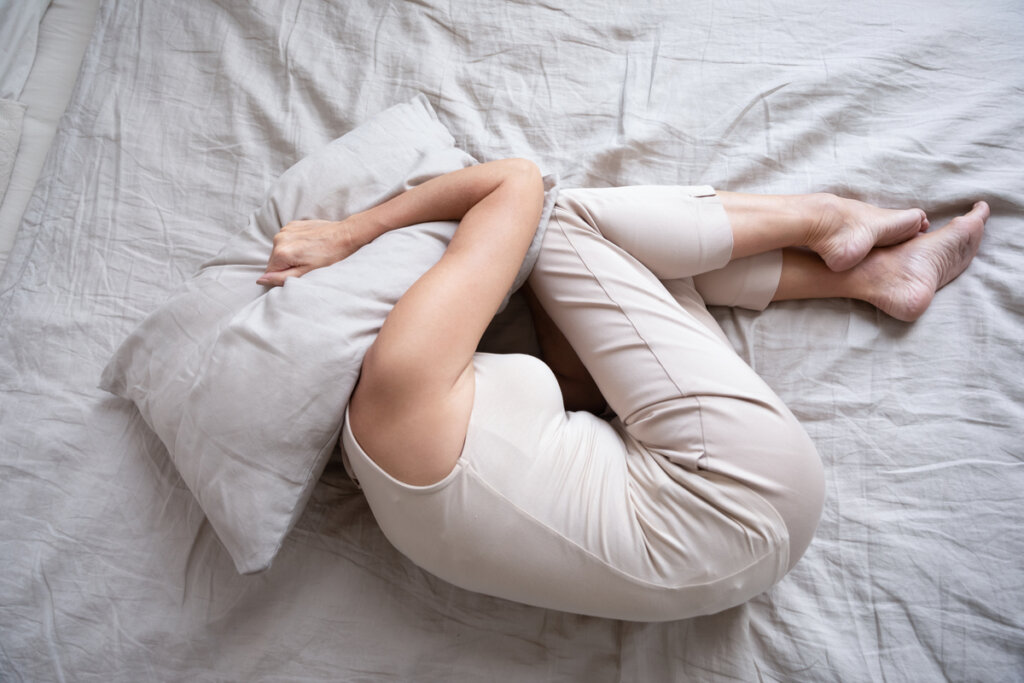Why Do You Cry in Your Sleep?


Written and verified by the psychologist Cristian Muñoz Escobar
Crying can be one of the greatest outlets when you’re suffering from emotional wounds or one of the best expressions of happiness when you’re celebrating. It can also accompany yawning, be a reaction to physical pain, or be due to a fit of laughter. You might also even cry in your sleep. If you’ve ever wondered why this happens, read on.
Let’s start with the manifestations that dreams cause. Your dream world is full of waking experiences and the eventualities of your life. They’re products of your experiences.
Dreams have their own logic even though they’re usually absurd and incomprehensible. Furthermore, these manifestations often have effects on your mood as you sleep.
When you’re dreaming you might speak, make sudden movements, scream, or even sleepwalk. Because when you’re sleeping, your brain doesn’t switch off. It must assimilate the information you continue to receive. This will be stored in brain nerve circuits and become chemical substances.
Sleep is an active and periodic biological state, in which NREM and REM cycles occur. These involve biological clocks. The process is made up of a complex neural network, in which different areas of the central nervous system are activated.
Why you may cry in your sleep
Your dream world is rich in fantasy and complexity, and can offer you different reasons for explaining why you cry in your sleep:
1. Suffering from a cold
Having a cold is often accompanied by physical ailments and other symptoms, one of which is watery eyes. These are often also present when you’re asleep. This symptom is temporary and doesn’t leave any psychic or physical mark.

2. Rest
Your eyes benefit from restful sleep. During the day, they can dry out, so it’s hardly surprising that, at night, they shed tears involuntarily. This is a reflex action, to cleanse themselves and recover moisture.
3. Emotional wounds
Your ability to fall asleep is decisive for a good night’s rest.
However, if you’re going through a particularly bad time, both your waking and sleep time will be filled with sadness. Your response will be to cry to relieve your suffering a little.
When you’re emotionally fragile and in pain, your tears act as a source of comfort. Therefore, if you wake up in the night crying it may well be an escape valve against your feelings of discomfort and anguish.
4. Nightmares
Nightmares may be the answer to why you’re crying in your sleep. That’s because they alter the regulation of your moods at rest, causing you to often wake with a start. Of course, as soon as you wake up, you tend to calm down.
Sometimes, nightmares are so intense that crying occurs as a cathartic effect. For example, it wouldn’t be unusual for you to have a nightmare in which you’re crying about something and you then wake up crying.
5. Feelings of rejection, abandonment, or helplessness
Dreams frequently bring past absences to the present.
For instance, if when you’re awake, you’re keeping alive the memory of a loved one who’s no longer with you, it’s highly likely that they’ll appear in your dreams. In this situation, rest can offer you no other alternative than for you to cry.
Have you ever cried in your dreams about someone who was or is special to you?

6. Lucid dreams
Lucid dreams are when, in the middle of a dream, you’re aware that you’re dreaming.
If you’re a lucid dreamer, you may decide to explore situations that you keep in the depths of your unconscious. Releasing them can trigger a really strong emotional reaction. This can make you cry.
Is crying bad?
Not at all. Crying is a primary function and you do it for several reasons. Firstly, there’s the basal tear, whose function is to lubricate and keep the eye free of dirt. Secondly, there’s the reflex action. This is when your eyes close voluntarily in the face of discomfort, such as burning, or when an object is going to enter your eye and you don’t have time to stop it. For instance, if an insect flies into your eye. Thirdly, there’s the cathartic function of crying. In other words, as a response to an emotional release.
So cry when you need to, whether your eyes are doing it reflexively or to regulate your emotions.
Crying can be one of the greatest outlets when you’re suffering from emotional wounds or one of the best expressions of happiness when you’re celebrating. It can also accompany yawning, be a reaction to physical pain, or be due to a fit of laughter. You might also even cry in your sleep. If you’ve ever wondered why this happens, read on.
Let’s start with the manifestations that dreams cause. Your dream world is full of waking experiences and the eventualities of your life. They’re products of your experiences.
Dreams have their own logic even though they’re usually absurd and incomprehensible. Furthermore, these manifestations often have effects on your mood as you sleep.
When you’re dreaming you might speak, make sudden movements, scream, or even sleepwalk. Because when you’re sleeping, your brain doesn’t switch off. It must assimilate the information you continue to receive. This will be stored in brain nerve circuits and become chemical substances.
Sleep is an active and periodic biological state, in which NREM and REM cycles occur. These involve biological clocks. The process is made up of a complex neural network, in which different areas of the central nervous system are activated.
Why you may cry in your sleep
Your dream world is rich in fantasy and complexity, and can offer you different reasons for explaining why you cry in your sleep:
1. Suffering from a cold
Having a cold is often accompanied by physical ailments and other symptoms, one of which is watery eyes. These are often also present when you’re asleep. This symptom is temporary and doesn’t leave any psychic or physical mark.

2. Rest
Your eyes benefit from restful sleep. During the day, they can dry out, so it’s hardly surprising that, at night, they shed tears involuntarily. This is a reflex action, to cleanse themselves and recover moisture.
3. Emotional wounds
Your ability to fall asleep is decisive for a good night’s rest.
However, if you’re going through a particularly bad time, both your waking and sleep time will be filled with sadness. Your response will be to cry to relieve your suffering a little.
When you’re emotionally fragile and in pain, your tears act as a source of comfort. Therefore, if you wake up in the night crying it may well be an escape valve against your feelings of discomfort and anguish.
4. Nightmares
Nightmares may be the answer to why you’re crying in your sleep. That’s because they alter the regulation of your moods at rest, causing you to often wake with a start. Of course, as soon as you wake up, you tend to calm down.
Sometimes, nightmares are so intense that crying occurs as a cathartic effect. For example, it wouldn’t be unusual for you to have a nightmare in which you’re crying about something and you then wake up crying.
5. Feelings of rejection, abandonment, or helplessness
Dreams frequently bring past absences to the present.
For instance, if when you’re awake, you’re keeping alive the memory of a loved one who’s no longer with you, it’s highly likely that they’ll appear in your dreams. In this situation, rest can offer you no other alternative than for you to cry.
Have you ever cried in your dreams about someone who was or is special to you?

6. Lucid dreams
Lucid dreams are when, in the middle of a dream, you’re aware that you’re dreaming.
If you’re a lucid dreamer, you may decide to explore situations that you keep in the depths of your unconscious. Releasing them can trigger a really strong emotional reaction. This can make you cry.
Is crying bad?
Not at all. Crying is a primary function and you do it for several reasons. Firstly, there’s the basal tear, whose function is to lubricate and keep the eye free of dirt. Secondly, there’s the reflex action. This is when your eyes close voluntarily in the face of discomfort, such as burning, or when an object is going to enter your eye and you don’t have time to stop it. For instance, if an insect flies into your eye. Thirdly, there’s the cathartic function of crying. In other words, as a response to an emotional release.
So cry when you need to, whether your eyes are doing it reflexively or to regulate your emotions.
All cited sources were thoroughly reviewed by our team to ensure their quality, reliability, currency, and validity. The bibliography of this article was considered reliable and of academic or scientific accuracy.
- Fitzgerald, O. & Mejía,E. (2007). Función Social de las Lágrimas: Una Indagación empírica sobre los tipos de llanto emocional. Universitas Psychologica, 6(2), 295-308. https://www.redalyc.org/articulo.oa?id=64760209
- Malinowski, M. (2008). Acerca de la vida onírica en pacientes con patología orgánica. Subjetividad y Procesos Cognitivos, (11), 99-113. https://www.redalyc.org/articulo.oa?id=339630250005
- Velayos, J.; Moleres, F.; Irujo, A.; Yllanes, D. & Paternain, B. (2007). Bases anatómicas del sueño. Anales del Sistema Sanitario de Navarra, 30(Supl. 1), 7-17. http://scielo.isciii.es/scielo.php?script=sci_arttext&pid=S1137-66272007000200002&lng=es&tlng=es
This text is provided for informational purposes only and does not replace consultation with a professional. If in doubt, consult your specialist.







